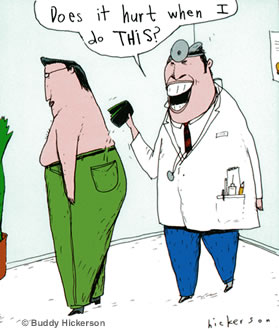Note from Dr. Bernstein: This article, by my colleague Dr. Rassman, is such important reading for anyone considering a hair transplant, that I felt it should be posted here in its entirety.
Areas of Unethical Behavior Practiced Today
William Rassman, MD, Los Angeles, California
I am disturbed that there is a rise in unethical practices in the hair transplant community. Although many of these practices have been around amongst a small handful of physicians, the recent recession has clearly increased their numbers. Each of us can see evidence of these practices as patients come into our offices and tell us about their experiences. When a patient comes to me and is clearly the victim of unethical behavior I can only react by telling the patient the truth about what my fellow physician has done to them. We have no obligation to protect those doctors in our ranks who practice unethically, so maybe the way we respond is to become a patient advocate, one on one, for each patient so victimized. The following reflects a list of the practices I find so abhorrent:
 1. Selling hair transplants to patients who do not need it, just to make money. I have met with an increasing number of very young patients getting hair transplants for changes in the frontal hairline that reflect a maturing hairline, not balding. Also, performing surgery on very young men (18-22) with early miniaturization is in my opinion outside the “Standard of Care”. Treating these young men with a course of approved medications for a full year should be the Standard of Care for all of us.
1. Selling hair transplants to patients who do not need it, just to make money. I have met with an increasing number of very young patients getting hair transplants for changes in the frontal hairline that reflect a maturing hairline, not balding. Also, performing surgery on very young men (18-22) with early miniaturization is in my opinion outside the “Standard of Care”. Treating these young men with a course of approved medications for a full year should be the Standard of Care for all of us.
2. Selling and delivering more grafts than the patient needs. Doctors are tapping the well of the patient’s graft account by adding hundreds or thousands of grafts into areas of the scalp where the miniaturization is minimal and balding is not grossly evident. I have even seen patients that had grafts placed into areas of the scalp where there was no clinically significant miniaturization present. Can you imagine 3,000-4,000 grafts in an early Class 3 balding pattern? Unwise depletion of a patient’s finite donor hair goes on far more frequently than I can say.
3. Putting grafts into areas of normal hair under the guise of preventing hair loss. There are many patients who have balding in the family and watch their own “hair fall” thinking that most of their hair will eventually fall out. A few doctors prey on these patients and actually offer hair transplantation on a preventive basis. This is far more common in women who may not be as familiar with what causes baldness and do not have targeted support systems like this forum. They become more and more desperate over time and are willing to do “anything” to get hair. They are a set-up for physicians with predatory practice styles.
4. Pushing the number of grafts that are not within the skill set of surgeon and/or staff. The push to large megasessions and gigasessions are driven by a limited number of doctors who can safely perform these large sessions. Competitive forces in the marketplace make doctors feel that they must offer the large sessions, even if they can not do them effectively. A small set of doctors promote large sessions of hair transplants, but really do not deliver them, fraudulently collecting fees for services not received by the patient. Fraud is a criminal offense and when we see these patients in consultation, I ask you to consider your obligation under our oaths and our respective state medical board license agencies to report these doctors.
5. Some doctors are coloring the truth with regard to their results, using inflated graft counts, misleading photos, or inaccurate balding classifications. False representation occurs not only to patients while the doctor is selling his skills, but also to professionals in the field when the doctor presents his results. Rigging patient results and testimonials are not uncommon. Lifestyle Lift, a cosmetic surgery company settled a claim by the State of New York over its attempts to produce positive consumer reviews publishing statements on Web sites faking the voices of satisfied customers. Employee of this company reportedly produced substantial content for the web.
The hair transplant physician community has developed wonderful technology that could never have been imagined 20 years ago. The results of modern hair transplantation have produced many satisfied patients and the connection between what we represent to our patient and what we can realistically do is impressive today. Unfortunately, a small handful of physicians have developed predatory behavior that is negatively impacting all of us and each of us sees this almost daily in our practices. Writing an opinion piece like this is not a pleasant process, but what I have said here needs to be said. According to the American Medical Association Opinion 9.031- “Physicians have an ethical obligation to report impaired, incompetent, and/or unethical colleagues in accordance with the legal requirements in each state……”
Rassman, WR: Areas of unethical behavior practiced today. Hair Transplant Forum Intl. Sep/Oct 2009; 19(5) 1,153.
Posted by Robert M. Bernstein M.D.  CBS News’ The Early Show has picked up the “balding buzz” that first started to grow when the National Enquirer reported that New England Patriots star quarterback Tom Brady is seeking advice on how to treat his hair loss.
CBS News’ The Early Show has picked up the “balding buzz” that first started to grow when the National Enquirer reported that New England Patriots star quarterback Tom Brady is seeking advice on how to treat his hair loss.

 1. Selling hair transplants to patients who do not need it, just to make money. I have met with an increasing number of very young patients getting hair transplants for changes in the frontal hairline that reflect a maturing hairline, not balding. Also, performing surgery on very young men (18-22) with early miniaturization is in my opinion outside the “Standard of Care”. Treating these young men with a course of approved medications for a full year should be the Standard of Care for all of us.
1. Selling hair transplants to patients who do not need it, just to make money. I have met with an increasing number of very young patients getting hair transplants for changes in the frontal hairline that reflect a maturing hairline, not balding. Also, performing surgery on very young men (18-22) with early miniaturization is in my opinion outside the “Standard of Care”. Treating these young men with a course of approved medications for a full year should be the Standard of Care for all of us.



